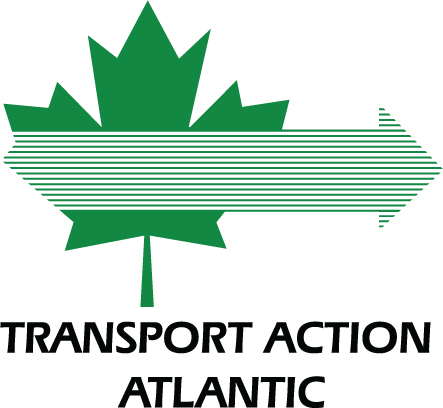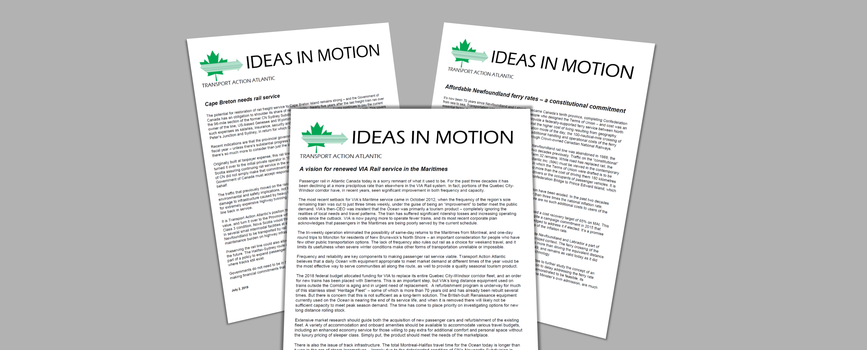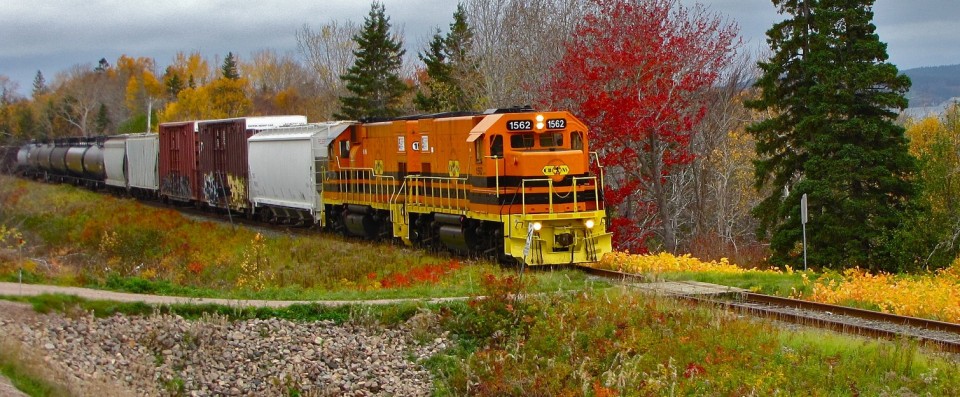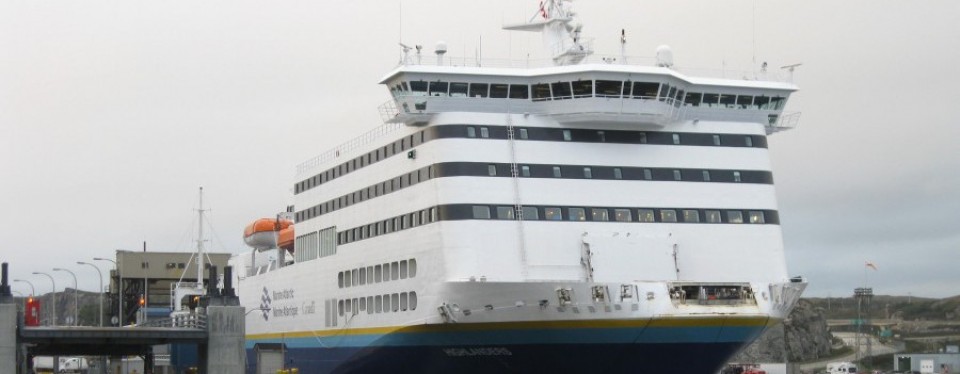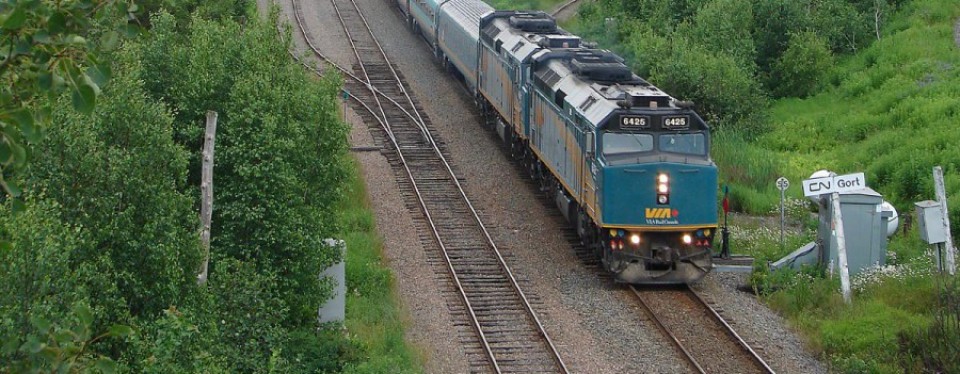– by Tim Hayman
(Editor’s Note: Don MacLeod, Ashley Morton and Tim Hayman represented TAA at the Sydney UARB hearing in December. Ashley Morton delivered the opening statement, but was unable to be present for closing arguments due to other commitments.)
The hearing got off to an interesting start, with the legal counsel for the CBNS (Michel Huart) raising concerns about potential bias on the part of the Chairman of the Board (Peter Gurnham), as Mr. Gurnham had been legal counsel for NSPI during the previous abandonment hearing in 2002. After a short period of deliberation, the board decided that there is no bias issue, as Mr. Gurnham had taken an appropriate period of abstention (three years) following his original appointment to the board.
CBRM was first to present, and made their case that the hearing should be adjourned until CN is at the table. They argued that the proposed discontinuance plan is not adequate if CN is not involved, due to “the letter” (I’ll just call it that, as we all know what that means). The Chair questioned whether CN’s obligation would only kick in if the CBNS discontinuance actually goes through, rather than at an earlier stage. CBNS responded simply: “we’re not CN, and we’re not the province”.
The board determines that the meeting will continue, as the Chair notes that UARB has no jurisdiction over either the province or CN, but suggests that it will be acceptable for participants to refer to that issue throughout their arguments.
CBNS began the formal process, by calling two witnesses for examination by Mr. Huart – these are Josée Danis, AVP of Corporate and Industrial Development for Genesee and Wyoming Canada, and Gareth Martin, in charge of sales and marketing for the CBNS. It is noted that Ms. Danis was assigned specifically to oversee the discontinuance and abandonment of the Sydney Sub. She has past experience (10 years) at CN, and seems very well versed in this kind of setting.
CBNS presented a variety of evidence in the form of graphics and tables (which had not been adequately prepared ahead of time – copies had to be made for each document, and this dragged out the proceedings). The first demonstrates the decline in traffic on the line; Ashley noted that the graph has the years 2001-2008 heavily condensed, which gives the impression of a more rapid decline.
Among other things exposed in the CBNS testimony is the fact that thanks to the massive rate increase effective January 1st (+$5500, for total of $7175/carload), all but three customers have dropped CBNS altogether for other alternatives. CBNS did not shy away from admitting that the rate increase was “likely” the cause of these customers leaving.
The other huge revelation was that CBNS will be discontinuing all rail service as of Dec. 31st, and replacing it with truck (using CN’s CargoFlo facility in Moncton….interestingly bypassing the CBNS entirely). This service will still be provided by CBNS, with them assuming all potential costs, though it will still cost the same inflated rate. Given that the rate increase was supposedly to offset the lack of subsidy to operate the line, I find this a bit confusing. One other interesting tidbit: in a “hypothetical” example of a force majeure type incident, Ms. Danis brings up the Grand Narrows bridge. We suspect CBNS has their eyes on that as a possible issue down the line.
We then moved on to the cross-examination by intervenors and the board, as well as opening statements. (TAA’s appears in full beginning on page 9.) Most intervenors were present, but NSPI was a notable absentee. I did not take detailed notes on each group’s arguments, but I did make some observations:
-Copol mentioned that their supplier has already raised concerns about not being able to have cars unloaded and returned because of the Dec. 31 deadline, and as such they are having issues getting new cars. The shipper also has concerns about transloading in Moncton, so Copol is currently concerned about getting product.
-There was a lot of concern raised about how the company can stop running trains during a period of discontinuance, particularly before the board has ruled. CBNS referred to this as a “reduction in service”.
-CBNS dumped responsibility for deferred maintenance problems on RailAmerica. They estimate future upgrade costs at $30 million (though timeframe is not clarified, as far as I can recall). They estimate the salvage value of the line at $15-25M.
-CBNS did in fact make mention of the CN/NS letter, and in fact point out that it was brought up at the meeting this summer with Minister Raitt and CN. They say it was dismissed quickly as “just some old letter” (exact quote).
-CBNS did note difficulty in competing with CN’s CargoFlo Moncton facility. They also suggest that they could not make any arrangement with Marine Atlantic, because Marine Atlantic is not a “shipper”.
-CBNS continues to emphasize the strange business with the subsidy: they turned it down, because if they didn’t they couldn’t apply for discontinuance. Now that they have turned it down, they have to increase rates. But after Dec. 31st, they won’t be running trains anyway…They also make it clear that they will have to raise the rates further if they are forced to run trains after the 31st, and indicate that it would also affect customers over the rest of the line to Truro.
-CBNS was notably hostile in their cross-examination of the various customers who presented their arguments. It seemed like their focus was on trying to discredit them by calling into question their statements that they were not given adequate notice in the discontinuance process.
The second day got underway at 9am, and was to consist of Mayor Clarke’s presentation, the railway’s final arguments, and then final statements from interested interveners.
Mayor Clarke’s presentation was excellent. In addition to repeating the comments he made the night before, he pointed out that in like fashion to GWI representing their shareholders, the local governments must respect their shareholders – the people of Cape Breton. He notes that three different political parties have been able to agree on the importance of this line. He also reiterated the common thread that the railway is showing disrespect for the UARB process by deliberately and systematically discontinuing service before the board has even made a decision. Don and I were very impressed by his presentation.
CBNS then made their final submission, wherein they emphasized that service on the Sydney Sub will end, unlike past attempts. They argued that the Railway Act required transition, not elimination of damages to customers, and made it clear that they believe they have made suitable attempts to “facilitate the transition” (i.e. hiking the rates). They also suggested that they had made more than enough attempts to find business, but that there simply isn’t anything out there (one of their evidence documents laid out the proposed sources of new business, and explained why each one wasn’t an option). Intermodal traffic, in their opinion, is still on the roads because shippers have made that choice.
The Chair specifically noted that “we’re quite troubled by that”, when there was reference to the notion that stopping rail service by January 1st constituted “adequate” continued service. When they pushed back, he went on to say: “Do you really think that the drafters of this legislaton [Bill 65] thought that you could end all rail service before the ruling of the board?” Before the discontinuance process even begins, they have effectively discontinued service.
The Chair very specifically asked if the CBNS would provide rail service after January 1st if one of their customers made it clear that they needed it. The answer from CBNS: emphatically, “NO”. Ms. Danis suggested on Day 1 that they would pursue legal advice if any attempt was made to force them to run trains after that date. They suggest it is not “reasonable” to move just a few railcars, especially since their costs will be higher in the winter months. They cite a previous supreme court decision on this issue with CP many years ago as precedent.
(A side note – CBNS had made a very particular designation on Day 1 between end users and shippers, particularly when cross-examining their customers. When pressed on the issue by the board, Mr. Huart acknowledged that the terms could really be used fairly interchangeably, and the definition weren’t clear)
We then moved on to final arguments. Some interveners made them, but not all. The Chair had stressed that final arguments should only be new comments, and not re-iteration of opening statements. Sean Burke (East Coast Rope) and the reps from Copol, Hilly Acres and TransAtlantic Preforms made excellent closing statements, which were very much in line with our positions.
We agreed that I should make a brief final statement to make our support for their positions clear, in which I re-iterated our position (as Ashley had laid out in the opening statement), and also voiced our support for the positions and arguments made by the previous groups. I also went on to make one further comment, specifically that we were particularly concerned about the shift of all traffic to trucks by January 1st; I pointed out that this put more trucks on the roads at an earlier date, thereby raising the concerns we mentioned right from the beginning. As well, since CBNS is still charging their customers the increased rate to move their freight (supposedly again to offset costs of running the line without the subsidy), it seems inconsistent to do so when the traffic is now on the roads and the infrastructure costs are being carried by the public.
CBRM re-iterated their point about the CN letter – but the board again suggested that it will have to be the Province who takes that one on. I think we’ve all come to the point of thinking that if anything is going to happen on that front (which it should), it will have to be through legal means.
The PC Caucus had an amusing moment where Alfie McLeod got up to admit he had been wrong the day before – there were not 300 jobs at stake, but rather 500! (Ms. Danis had raised skepticism around the 300 number on day 1).
Finally, Canwel (one of the customers who already left) stressed that their transition was not as smooth as CBNS had implied. It was in fact costly and difficult, and is currently only temporary. They only did it because they couldn’t afford the $5500 increase. They also suggested the idea of the Province giving the subsidy direct to customers.
And with that, the hearing wrapped up around 11am.
Click here to read the full text of TAA’s opening statement, as presented at the UARB hearing in Sydney on December 8, 2014, by Ashley Morton.
